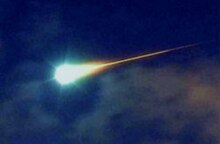Very bright flash over thousands of kilometers, ground-shaking explosion, Russia

©Anna Liesowska
A very bright flash was seen over thousands of kilometers over Russia around 00:22 local time January 7, 2018 (20:22 UTC, January 6). The flash was followed by a ground-shaking explosion.
According to witness reports, the explosion was centered west the Ural Mountains, especially over Bashkortostan, Udmurtia, and Tatarstan but was seen over a vast swath of Russia.
Experts are still divided over the cause of the event. While some insist the phenomenon was not manmade, as officials deny there were any missile test or explosion at the time, there are also no reports of meteorites striking the ground.
Witnesses contacting The Siberian Times said they had a feeling something 'massive had happened.'
"It lit the night sky from side to side, making it look brighter than daylight," one eyewitness told the paper. "We saw this while driving. There was a vibration and the sound of an explosion in the sky. Awesome," another one said.
"A meteor burned out, not reaching the lower layers of the atmosphere," eyewitness Denis Rozenfeld told The Siberian Times. "Before this, it exploded and split into many small pieces. That is why there was such a sound, which came to us in a few seconds."
Astronomers from the Kazan Federal University agreed with Denis, saying that the event was caused by a meteor entering Earth's atmosphere and burning out before reaching the ground. "This was a bolide that burnt in the dense layers of the atmosphere, which is why it was seen over such a big territory, Dr. Sergey Golovkin said. "We didn't register the flash because there was a strong blizzard that night," he added.
While this might seem like the most plausible explanation, Yuri Nefefyeb, the director of the Engelhardt Astronomical Observatory, argued that the origin was atmospheric electricity, adding that this is still something not properly explained by science.
"There are a huge number of effects linked to atmospheric electricity, many of which are not properly studied because of how rarely they occur," he said.
Some scientists said the bright light flash was refracting from low clouds, while others suggested it might have been a dry thunderstorm.
The International Meteor Organization (IMO) received no reports about this event, as of 10:00 UTC, January 9, 2018.
Featured image: Bright flash over Russia around 20:22 UTC on January 6, 2018. Credit: Anna Liesowska
Bron: https://watchers.news
Uitleg Bolide:
Een bolide is een meteoor of meteoriet die verschillend wordt gedefinieerd.Volgens een van de definities is een bolide een vuurbal die een magnitude −14 of helderder bereikt. De Internationale Astronomische Unie (IAU) beschikt niet over een officiële definitie van een bolide en beschouwt de term als synoniem met "vuurbal". Astronomen gebruiken het woord gewoonlijk om er een opvallend heldere vuurbal mee aan te duiden, vooral een die explodeert. De term wordt ook wel gebruikt voor vuurballen die een hoorbaar geluid voortbrengen.
Geologen gebruiken de term vaker dan astronomen: ze duiden er een object mee aan dat een grote inslag veroorzaakt. De United States Geological Survey (USGS) bezigt de term bijvoorbeeld voor een projectiel dat een grote krater vormt "om aan te geven dat we niet de precieze aard van het botsende lichaam kennen ... of het bijvoorbeeld een rotsachtige of metalen planetoïde is of een ijzige komeet"

©Thomas Grau
Bron: https://nl.wikipedia.org

 Mysterie in de lucht: Lichtflits Rusland, een bolide of atmosferische elektriciteit?
Mysterie in de lucht: Lichtflits Rusland, een bolide of atmosferische elektriciteit?




